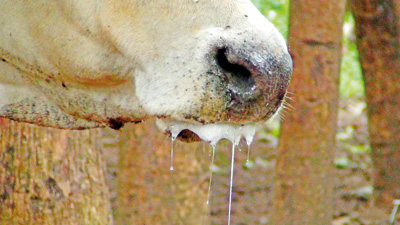News
Dairy industry under threat from fast-spreading Foot and Mouth disease in NW Province

Officials warned that the cattle may die of this disease if they were not treated early
Cattle in the North Western Province have been hit by the fast-spreading foot and mouth disease posing a threat to the dairy industry.
The North Western Province, Animal husbandry Additional Director Dr B.C.S Perea said that at least 14,000 cattle have been affected and that the disease had spread to the boarders of the province.
He explained the virus infection affects milk production as the diseased animals eat less and have difficulties to move around and graze.
He explained that though the disease is found in cattle, other hoofed animals such as goats and pigs could also be affected. The virus infection remains only for four to five days but it causes injuries and infections in the animals, he added.
With 85 percent of the cows in the province being infected, the dairy industry has been dealt a blow, he said, adding that the virus first hit the animals that had not been vaccinated and later spread to the vaccinated animals as well.
“There are several strains of the disease. Earlier we vaccinatd the animals for one strain, now we believe the animals are being infected from a different strain. We are working to identify the strain and either import or produce our own vaccine that would control the disease. Our headoffice is carrying out tests,” he said.
He said in order to contain and minimise the spread of the disease they have stopped providing permits to transport animals and are also refraining from visiting farms to prevent the spread of the disease.
“We have not restricted milk production in the area as this would inconvenience the farmers as they produce 195,000 litres of milk a day,” he said.
He said they have also collaborated with mass scale dairy companies to provide assistance to dairy farmers by providing medication to animals free of charge.
In a related development a private dairy farm that is open to the public has stopped this move to prevent the spread of the disease through visitors.
Meanwhile A.H.M Prikyantha Kumara a milk farmer in the Puttalam district said the primary cause for the infection was that the cattle had not been vaccinated on time for the past two years. “One cow is worth around Rs 200.000. So with the infection we don’t milk cows”
“Vijitha Kumara another farmer said, we live by this occupation. The vet office is giving the vaccination and injections for us to administrate but they are reluctant to come to the farms and attend to the hygienic work. If this continues the repercussions would be serious to the local milk sector,” he said.
Area resident A.M.M Srimali revealed that some 10 cows had already died from the disease. “The veterinary officers have not conducted any investigations. This is likely to affect the milk industry in Anamaduwa,” he said.

